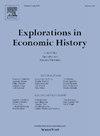Transition to agriculture and first state presence: A global analysis
Abstract
It has often been observed that the emergence of states in a region is typically preceded by an earlier transition to agricultural production. Using new data on the date of first state emergence within contemporary countries, we present a global scale analysis of the chronological relationship between the transition to agriculture and the subsequent emergence of states. We find statistically significant relationships between early reliance on agriculture and state age in all sub-samples and also when we use alternative sources of data at different levels of geographical aggregation. A one millennium earlier transition to agriculture among non-pristine states predicts a 317-430 year earlier state emergence. We uncover differences in cases where states were imposed from outside or when they emerged through internal origination. The agriculture-state lag is on average 3.1 millennia in internally originated (including pristine) states, and 2.7 millennia in externally originated states. We also explore some of the mechanisms through which agriculture is believed to have influenced the emergence of states. Our results indicate that the rise of social classes was often an intermediate step towards the presence of early states.

 求助内容:
求助内容: 应助结果提醒方式:
应助结果提醒方式:


